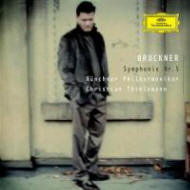|
You are reading the older HTML site
Positive Feedback
ISSUE
25
Bruckner, Symphony No. 5
Munich Philharmonic/Christian Thielemann DG
00289 477 5377. TT: 82.32 I didn't trust this one: previous previous DG releases found Thielemann imposing fussy, arbitrary distentions on Beethoven and Schumann symphonies, unwilling to let the scores speak for themselves. But the conductor projects the daunting, large-framed movements of Bruckner's Fifth Symphony creditably; and by not monkeying with the tempi within sections, he avoids the treacly situations which were the bane of those earlier records. The Munich Philharmonic, while perhaps not of Vienna or Berlin stature, has its own longstanding Bruckner traditions—witness their respected recording of this same symphony, years ago, under Rudolf Kempe—and this 2004 concert performance needn't yield to any other in its solid sonority and sense of purpose. The strings sound their midrange themes with impressive resonance, flute and clarinet solos are liquid and attractive, and the principal horn is eloquent. But many passages substitute an unsubtle mezzoforte for the indicated piano or pianissimo. On the other hand, I'd attribute the harsh edge on the heavy brass to the "long" ambience of the Munich Philharmonie rather than to any lack of finish in the actual playing. Thielemann lays out the music firmly, infusing it with a buoyant rhythmic spring (especially in the Scherzo), and makes few major tactical errors. A few nervous moments, as in the downward string tremolos that usher in the first movement development, suggest a persisting lack of clarity in Thielemann's basic stick technique—a shortcoming it's unlikely he'll address, given his already high profile—but hardly add up to a blot on the performance. Neither does the self-conscious, unflowing coordination of the cross-rhythms at the start of the Adagio—in which Thielemann is hardly alone—nor does the unmarked ritard that renders the Scherzo's final cadence soggy. It's not such technical or interpretive miscalculations that leave this performance curiously unsatisfying, but a more elusive and yet more pervasive problem: the expressive significance of the musical details hasn't always quite been worked out. The deadpan, uninflected treatment of the brass chorales—even those in which chromatic chords should intensify the expression—and the random moments of unfocused heaviness in the basses are clear symptoms: for once with Thielemann, everything may be more or less in place, but we don't understand why we've "made the journey." The sound is vivid and brilliant at full volume—allowing for the ambient edge previously cited—though a few very soft tremolos barely register.
|

